

Downloads. Assessment centres Information. What is an assessment centre?
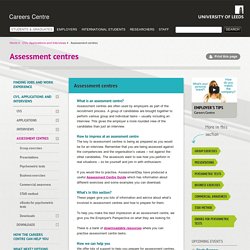
Assessment centres are often used by employers as part of the recruitment process. A group of candidates are brought together to perform various group and individual tasks – usually including an interview. This gives the employer a more rounded view of the candidates than just an interview. Assessment and Psychometric Tests books. The graduate's guide to assessment centres. Assessment centres are a regular feature of the recruitment process for graduate schemes.
Employers bring together a group of candidates who complete a series of exercises, tests and interviews that are designed to evaluate their suitability for graduate jobs within the organisation. This format makes it much easier for you to showcase a broader range of skills and competences than you would have opportunity to demonstrate in an interview.
For this reason they are a much fairer and more effective way to select graduates than traditional interviews. Assessment centres. A very common feature of graduate recruitment, assessment centres gather a group of candidates in the same place at the same time to compete for highly prized jobs What is an assessment centre?
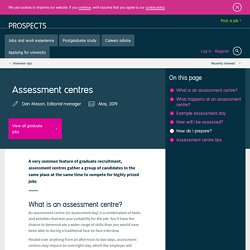
An assessment centre (or assessment day) is a combination of tasks and activities that test your suitability for the job. You'll have the chance to demonstrate a wider range of skills than you would have been able to during a traditional face-to-face interview. Hosted over anything from an afternoon to two days, assessment centres may require an overnight stay, which the employer will normally arrange. You'll usually be joined by six to eight other candidates but it's important to keep focused on your own performance. Assessment centres advice for graduates. Assessment centres: an overview. What is an assessment centre?
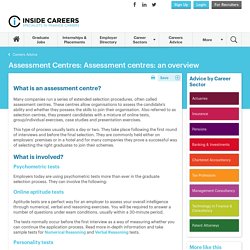
Many companies run a series of extended selection procedures, often called assessment centres. These centres allow organisations to assess the candidate’s ability and whether they possess the skills to join their organisation. Also referred to as selection centres, they present candidates with a mixture of online tests, group/individual exercises, case studies and presentation exercises. This type of process usually lasts a day or two. They take place following the first round of interviews and before the final selection. What is involved? Psychometric tests Employers today are using psychometric tests more than ever in the graduate selection process. Assessment centre guide. Downloads. Class of 2018: Tips for assessment centres. This piece was written by Sherry Zhang, who studies MSc Management Consulting at Leeds University Business School.
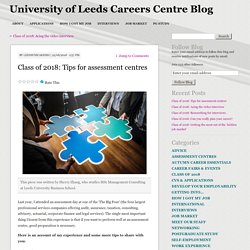
Last year, I attended an assessment day at one of the ‘The Big Four’ (the four largest professional services companies offering audit, assurance, taxation, consulting, advisory, actuarial, corporate finance and legal services). The single most important thing I learnt from this experience is that if you want to perform well at an assessment centre, good preparation is necessary. Assessment Centres no cropmarks. Imperial College London. Why assessment centres?
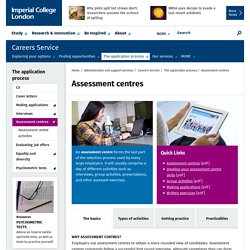
Employers use assessment centres to obtain a more rounded view of candidates. Assessment centres commonly follow a successful first round interview, although sometimes they can form your first face-to-face contact with the employer. Assessment Centres. How to prepare and perform to your best at assessment centres 15 02 03. 10 sure-fire ways to flunk your assessment centre. Love them or loathe them, assessment centres are here to stay.
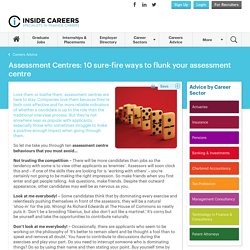
Companies love them because they’re both cost effective and far more reliable indicators of whether a candidate is up to the role than the traditional interview process. But they’re not anywhere near as popular with applicants, especially those who sometimes struggle to make a positive enough impact when going through them. So let me take you through ten assessment centre behaviours that you must avoid… Not trusting the competition – There will be more candidates than jobs so the tendency with some is to view other applicants as ‘enemies’. Assessors will soon clock this and – if one of the skills they are looking for is ‘working with others’ – you’re certainly not going to be making the right impression.
Look at me everybody! Don’t look at me everybody! Time out? I’m just not listening – Many instructions for exercises are given verbally. Time for a rest – Remember that assessors will be watching you most of the time. How to be your best self at graduate assessment centres. Here are our top tips on how to behave at assessment centres for graduate jobs: 1.
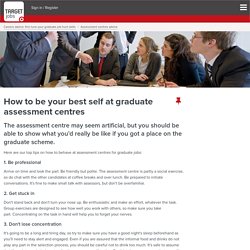
Be professional Arrive on time and look the part. Be friendly but polite. The assessment centre is partly a social exercise, so do chat with the other candidates at coffee breaks and over lunch. 2. Don't stand back and don't turn your nose up. 3. Assessment Centres - Careers Service. Preparation Assessment centres give the employer the chance to observe you and see what you can do, rather than what you say you can do, in a variety of situations.
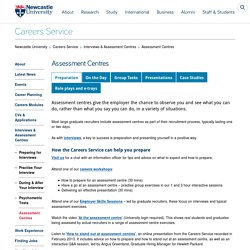
Most large graduate recruiters include assessment centres as part of their recruitment process, typically lasting one or two days. As with interviews, a key to success is preparation and presenting yourself in a positive way. How the Careers Service can help you prepare. Assessment centre feedback. Information Tree. Interview tests and exercises. Employers can set many different interview tasks, so get the competitive edge by preparing for what you might encounter Presentations These assess your ability to communicate clearly and formally, testing your skills in timing, persuasion, analysis, public speaking and creativity.
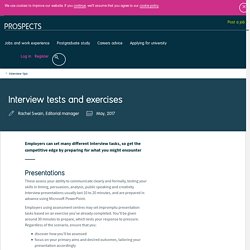
Interview presentations usually last 10 to 20 minutes, and are prepared in advance using Microsoft PowerPoint. Employers using assessment centres may set impromptu presentation tasks based on an exercise you've already completed. Selection and Assessment Centres. What are assessment centres? Selection centres (also known as selection centres) consist of a number of exercises designed to assess the full range of skills and personal attributes required for the job. Why hold assessment centres? They are one of the most reliable methods of assessing candidates. Interviews, or any other method, taken alone, may be as low as 15% accurate.
However, when scores from a number of different selection exercises are combined, their accuracy can rise to over 60%. Nottingham AssessmentCentres. How to prepare for an assessment centre. Assessment centres are an increasingly popular tool in the recruitment process of graduate employers.
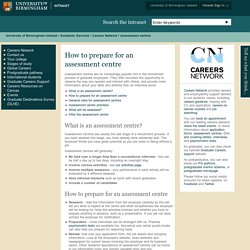
They offer recruiters the opportunity to observe the way you operate and interact with others, and provide more information about your skills and abilities than an interview alone. Practice Assessment Centre Exercises. Experts reveal all: assessment centres explained This free guide to assessment centres is an authoritative manual on how assessment centres work and what knowledge candidates should take into the assessment centre with them. Nerves and unfamiliarity are the biggest culprits of underperformance. Activities at an assessment centre.
Each employer will use different exercises to assess your skills and abilities. We've put together some hints and tips on facing some of the most commonly used exercises. Group activities What to expect These will involve all or a group of candidates, including yourself, and will normally be a discussion with certain defined objectives. You will be observed by the assessors throughout, so make sure to focus on the activity. Structured - you will be given a designated role such as IT specialist; you may have information that nobody else has and vice versa, and may be set personal objectives that will partly conflict with the rest of the group. Business exercises. Business exercises What should you expect? These exercises are usually closely related to the role and will assess the skills required for the job. They are usually based on real business situations and will test skills such as organisation, problem solving, data analysis, planning and decision making.
File107382. Written Exercises no cropmarks. Role Play Exercise. Role-play exercises and how they work Role play exercises are among the most popular assessment tools used by graduate recruiters at the assessment centre stage of the recruitment process. Role play exercises are very common in graduate recruitment scheme selection, and are particularly useful when assessing candidates for client facing positions such as consulting, sales and law.
Although many group exercises may incorporate aspects of role-play, typical role play exercises are conducted one to one, either with a member of the recruitment team or an actor. Candidate’s performance will be observed throughout the exercise and their performance will be assessed, noting the candidate’s strengths and weaknesses. The content and context of role play exercises will vary considerably depending on the role and the organisation, however typically candidates will be role-playing the position in which they have applied, and will need to act out a common workplace scenario/problem. 1. 2. 3. 4. 5.
Presentations. Can I prepare for the Assessment Centre Social Event? If you are invited to an assessment centre then it will probably involve at least buffet lunch or in some cases an evening dinner. This is the part of the recruitment process that is not formally assessed and is meant to be an informal way for you to find out more about the organisation and its values. However, these social events do provide the assessors with an opportunity to see how you engage with your peers and to see what questions you ask incumbent managers and recent graduates.
They also provide an opportunity for the assessors to see how you act in an informal social environment. The assessors need to be confident that you are going to be a good ‘ambassador’ for the organisation, particularly if your role is likely to involve socialising with clients or people from other organisations. It is all too easy to disparage small talk and etiquette as being irrelevant, out-of-date and at odds with modern notions of unbridled self expression.